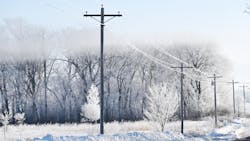NERC Warns of Regional Reliability Risk this Winter; Stresses Readiness Planning
NERC’s assessment for the upcoming winter finds that reliability risk is elevated in regions that are especially vulnerable to extreme weather, natural gas supply disruptions and low hydro conditions. NERC’s 2021–2022 Winter reliability assessment advises industry to ensure the readiness of operating plans to manage potential supply shortfalls and take proactive steps for generator readiness, fuel availability and sustained operations in extreme conditions.
Winter weather conditions that exceed projected conditions can expose power system generation and fuel delivery infrastructure vulnerabilities that challenge electricity system operators’ ability to maintain reliability of the bulk power system. Regions of particular risk this winter include:
- Central United States: Peak demand or generator outages that exceed forecasts — at levels that have been experienced in previous winter events, such as the February 2021 Cold Weather Event — can be expected to cause energy emergencies in MISO, SPP and ERCOT this winter season.
- New England and California: New England’s transportation infrastructure can be constrained when cold temperatures cause peak demand for both generation and consumer heating needs. New England competes for liquefied natural gas supply on the world market and unprecedented high liquefied natural gas demand is anticipated for this winter. California has limited storage and lacks redundancy in the supply infrastructure.
- Western United States and Canada: Continuing drought in the West has caused low hydro conditions and could reduce the supply of electricity available for transfer. Higher demand from more extreme temperatures in the Northwest could cause a shortfall. Low hydro conditions can reduce transfers needed to mitigate a wide-area cold weather event.
“Winter Storm Uri highlighted the vulnerabilities of our electricity and natural gas systems during long duration, widespread cold-weather conditions. The industry has taken major steps to prepare for extreme weather conditions this winter, but our existing generation fleet and fuel infrastructure remain exposed in many areas,” said Mark Olson, manager of Reliability Assessments. “To be resilient in extreme weather, we are counting on our grid operators to proactively monitor the generation fleet, adjust operating plans and keep the lines of communication open.”
This year’s assessment highlights two additional key findings for the upcoming winter season:
- Generator owners are facing challenges in obtaining coal and oil fuels as supply chains are stressed.
- Responses to NERC’s Level 2 Alert: Cold weather preparations for extreme weather events indicate that operating plans for winter are in place, but generator resource availability could again suffer as a result of equipment failure or lack of fuel under severe winter conditions.
To reduce the risks of energy shortfalls on the grid this winter, NERC recommends the following:
- Grid operators, generator owners and generator operators should review the NERC Level 2 Alert and NERC’s Generating Unit Winter Weather Readiness Guideline, taking recommended steps prior to winter.
- Balancing authorities should poll their generating units periodically and in advance of approaching severe weather to understand their readiness level for normal and extreme conditions, giving consideration for unit weatherization as well as fuel supply risk.
- Balancing authorities and reliability coordinators should conduct drills on alert protocols to ensure that they are prepared to signal need for conservative operations, restrictive maintenance periods, etc. Balancing authorities and generator operators should verify protocols and operator training for communication and dispatch.
- Distribution Providers and Load-Serving Entities should review non-firm customer inventories and rolling black out procedures to ensure that no critical infrastructure loads (e.g., natural gas, telecommunications) would be affected.
Undertaken annually in coordination with the regional entities, NERC’s winter reliability assessment examines multiple factors that collectively provide deep and unique insights into reliability risk. These factors include resource adequacy, encompassing reserve margins and scenarios to identify operational risk; fuel assurance; and preparations to mitigate reliability concerns.
The report encourages industry to discuss their plans and preparations to ensure reliability for the upcoming winter period (December 2021–February 2022).
